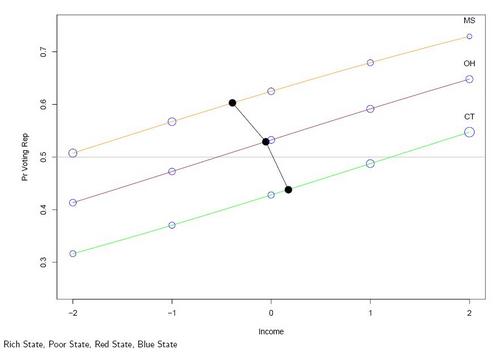Watch out for Big Brother
Big brother is watching. So are we.
Rich Man, Poor Man; Rich State, Poor State
Statistical Modeling, Causal Inference, and Social Science is one of my favorite new blogs. It is primarily written by Andrew Gelman, a professor in the Departments of Statistics and Political Science at Columbia University.
A recent post looks at the difference between red and blue states and red and blue individuals. We all know that in the recent election poorer states tended to vote Republican while richer states tended to vote Democrat. On the basis of the famous maps many people jumped to the conclusion that poorer individuals were voting Republican (Nascar Republicans) while richer individuals were voting Democrat (trust fund Democrats). But the inference is a fallacy, the ecological fallacy. In fact, high-income individuals, as opposed to high-income states, vote Republican with greater likelihood than low-income individuals (the effect is not huge and it may be declining but it is significant).
It’s even true that rich counties tend to vote Republican with greater likelihood than poorer counties. Gelman links to this graph which nicely illustrates the ecological fallacy. The three lines show that within each state higher-income counties are more likely to vote Republican but when you look between states the correlation between income and voting Republican is negative. (Click to enlarge).
Aspirin and the FDA
If aspirin were invented today it might not be approved by the FDA. Keep this in mind when thinking about Vioxx, Bextra and other pain-relief drugs that have recently been taken off the market. This is not to say that the new pharmaceuticals are "safe," but rather that all pharmaceuticals involve tradeoffs.
DeLong on Hazlitt
Brad DeLong criticizes Henry Hazlitt’s Economics in One Lesson. First, "because at least half its pages hint that the works of John Maynard
Keynes are an abomination without ever grappling with the Keynesian
argument."
Hazlitt did not say much about Keynes in his famous introduction to economics but he certainly grappled with the Keynesian argument in his lesser-known
The Failure of the ‘New Economics’: An Analysis of the Keynesian Fallacies.
Second, DeLong quotes Hazlitt:
There are men regarded today as brilliant economists, who deprecate
saving and recommend squandering on a national scale as the way of
economic salvation; and when anyone points to what the consequences of
these policies will be in the long run, they reply flippantly, as might
the prodigal son of a warning father: "In the long run we are all
dead." And such shallow wisecracks pass as devastating epigrams and the
ripest wisdom.
According to Brad this quote is "dishonest" and a "misrepresentation," but Keynes did deprecate saving and recommend squandering. Famously:
To dig holes in the ground,” paid for out of savings, will increase,
not only employment, but the real national dividend of useful goods and
services. (General Theory, Ch. 16).
Brad seems to think that Hazlitt quoted Keynes out of context because "What Keynes actually wrote in his Tract on Monetary Reform" was:
Now ‘in the long run’ this [way of summarizing the
quantity theory of money] is probably true…. But this long run is a
misleading guide to current affairs. In the long run we are all dead.
Economists set themselves too easy, too useless a task if in
tempestuous seasons they can only tell us that when the storm is long
past the ocean is flat again.
But the misreading is Brad’s not Hazlitt’s. Keynes is criticizing classical economics for focusing on the long run and this certainly includes the classical focus on savings as a key to economic growth. Hazlitt, as Brad notes, is restating classical economics so when Hazlitt points out the long-run problems with using spending to increase short-run aggregate demand, Keynes does, in effect, reply "We are all dead in the long run."
For some, it seems, one lesson is not enough. 🙂
More on Papal Elections
This quote from a conclavist to Cardinal Ferrieri in the conclave of Leo XIII says a lot about the process. I love the last sentence.
The Germans are on his side as will be the Spanish tomorrow because Franchi has now sided with Pecci; Howard, who up to now has voted for Simeoni, will vote for Pecci tomorrow; as I’m sure Your Eminenccy is aware, Bilio declared to Barolini that if he were to be elected he would not accept, for he considers it a heavy burden; Monaco and Randi will continue to vote for Martinelli; Franzelin likes Monaco, but he is wasting his time: Your Eminency, you must accept the truth, God has chosen Pecci.
The quote is cited in The Papal Conclave: How do Cardinals Divine the Will of
God?. The author, J.T. Toman has collected voting data (from diaries etc.) of voting in many of the conclaves in order to produce a paper that combines econometrics, theology, and voting theory!
If that doesn’t sound like your cup of tea, perhaps you will enjoy Incredible Popeman, a new comicbook which "shows the late Polish pontiff meeting comic book
legends such as Batman and Superman to learn how to use superpowers to battle Satan."
Thanks to Daniel Strauss Vasques and Stan Tsirulnikov, respectively, for the pointers.
Security Bonds
A member of the Canadian parliament apparently required that constituents who wanted his help in obtaining visitor visas first post a bond promising that the visitor would return to the home country. (It’s unclear whether any actual exchanges of money took place or whether this was a publicity stunt designed to promote a bill implementing a more formal procedure.)
The ethics of an MP offering money for services is questionable but the basic idea is sound. Australia, for example, has had a Security Bond system for nearly five years. Family who wish to sponsor visitors may be asked to post a bond which is subject to forfeiture if the visitor fails to keep to the terms of the visa. The bond system is good for the government which has fewer illegal visitors to track down (note that I am not here taking a position on the merits or demerits of immigration) but it’s also good for prospective visitors.
Under the old system if the government thought that a visitor might violate the terms of the visa they didn’t let him in. Now the family can post a bond and the visitor is allowed entry – moreover, since the money is returned when the visitor leaves, the system has low costs for honest entrants and their families. Since implementing the system most visitors (68%) are required to post bonds and the entry rate has increased. A good deal all around.
Directions to my office
Seth Roberts is Utterly Mad (but in a good way)
Seth Roberts is a psychologist at Berkeley who for the past twelve years has obsessively kept data on himself in an effort to generate and test new ideas. In a recent paper in Behavioral and Brain Sciences he explains some of his methods and findings (a number of comments, most of which I think are blah, blah, blah are also included).
Roberts, for example, drank 5 liters (!) of water every day for 4 months to test a theory of weight loss (he lost weight but he couldn’t keep up the drinking!). He also began standing for more than 8 hours a day, initially to test the affect on weight loss but instead he found that standing, especially 10 hours or more a day, dramatically improved his sleep. Eventually, he did find a novel form of weight loss involving fructose water (read the paper). Some of his findings seem bizarre, such as watching faces on tv in the morning improved his mood the next day but lowered it that night.
It’s tempting to dismiss all of this (especially before reading the paper and looking at the care with which Roberts kept his data) and clearly, I wouldn’t take any experiment with 1 subject as definitive. Roberts, however, is making the case that careful measurement of self-response is a way of generating new ideas. Roberts, for example, did not set out to test the idea that viewing faces improved mood this was a surprising discovery.
A virtue of self-experimentation is that it doesn’t take a million dollar lab and a bevy of graduate students, with some willpower and a willingness to carefully document and measure results, anyone can do cutting-edge science.
Electing a Pope
After the Athenians, Catholic scholars were among the first to analyze problems of voting (what is today called social choice theory). The potential for chaotic elections was certainly familar to the Cardinals who after many disputes over who should be Pope settled on the current two-thirds rule for election in 1179. And while I wouldn’t go so far as Pope Pius II who in 1458 said (after his own election (of course!) "What is done by two thirds of the sacred college, that is surely of the Holy Ghost, which may not be resisted," it is interesting to note that 2/3rds does have a number of special stability properties (see the difficult paper of Saari here and the earlier link).
For more on the history and practice of Papal elections you can listen to two free historical lectures from The Teaching Company.
Markets in Everything
The Whizzinator is a fake penis, urine bag and syringe designed to beat drug tests. It is said to be "foolproof" although according to the May Atlantic "actor Tom Sizemore" [insert joke here] "was caught using one during a drug test in February." It also does not inspire confidence to read that "YES, WE SELL DEHYDRATED URNIE SEPARATLEY."
As Tyler has noted, Markets in Everything is often sad but in this case it’s the demand, or rather the reasons for the demand, not the supply that I find most sad.
In-vitro meat and the animal welfare movement
I predict that the animal welfare movement will expand dramatically in the next several decades as in-vitro meat becomes widely available. In-vitro meat is "made in the laboratory" meat – it’s real meat but grown in "vats" rather than on animals. In-vitro meat has already been grown in thin slices, thick steaks are harder because fresh meat must be fed nutrients by a blood supply and that requires an incredibly complicated network of capillaries and veins. But really, who is going to notice the difference in a McDonald’s patty? I bet thin meat tastes a lot better than tofu.
I think that many people have an idea in the back of their minds that something is not quite right about the treatment of animals (see Tyler’s post) but so long as they taste good and there are few substitutes why bring the idea to the forefront when it will just make you feel bad? In-vitro meat will change this equation. With a ready substitute suppression will no longer be necessary and the question of animal welfare will explode into the public consciousness.
Forget PETA, animal welfarists should be sending their money to researchers working on in-vitro meat.
Aside from animal welfare, in-vitro meat could be economic. In an article in 1932 Winston Churchill argued:
Fifty years hence we shall escape the absurdity of growing a whole chicken in order to eat the breast or wing by growing these parts separately under a suitable medium.
This quote is often put forward as an example of foolish prediction but my bet is that Churchill was off by no more than a factor of ~2.
Addendum: No, this isn’t an April Fool’s joke!
Stop-Loss Regrets
The Army and National Guard are having trouble meeting their recruitment goals. The basic reasons are obvious but I suspect that an overlooked reason is the use in recent years of stop-gap and stop-loss policies – pulling people back into military service (from the Individual Ready Reserve) possibly years after their active duty has been completed and preventing people from leaving the field after their contractual obligations have ended, respectively.
It’s one thing to volunteer for a known tour of duty – it’s something more to subject your life-plans to an unknown schedule dictated by someone else. The stop-loss measures may have stopped losses temporarily but part of the price is understandably reluctant recruits.
Markets in Everything: Super Blogging
You too can learn the Secrets of the Super Bloggers! For just $97 you get the "Power User’s Guide to Becoming A Super Blogger!," "Blogging made easy," and "Blog about this." But that’s not all, you also get "Insider
Blogging Secrets! How
To Blog Your Way To Success!"
Blog Your Way To Success!"
But of course "you must act fast to get the maximum benefit from Blogging."
Thanks to the always super J-Walk-Blog for the pointer.
Sachs v. Easterly
It’s sad to see a first-rate economist descend to the level of a third-rate politician. But saddened is what I feel after reading Sach’s response to Easterly’s review of The End of Poverty (see also Tyler’s comments).
Consider this:
Easterly’s simplistic approach fits well with many conservatives in
Washington, who would rather blame the poor than help them. Somehow the
world’s poorest people are made out to be our enemy. According to this
upside-down worldview, the people dying of malaria are out for our
money — all $3 per year that it would cost each person in the rich
world to help Africa mount an effective control program!
Easterly, of course, said no such thing. What he said is that the tinpot dictators of Africa and their cronies are out for our money and they often succeed in diverting it to their own pockets. Ignoring this reality is the simplistic approach.
Two of my favorite things
NASA, in partnership with the Spaceward Foundation, will offer prizes for advances in strong lightweight tethers and for methods of transmitting power wirelessly, both key aspects of a space elevator. More from the NYTimes.

